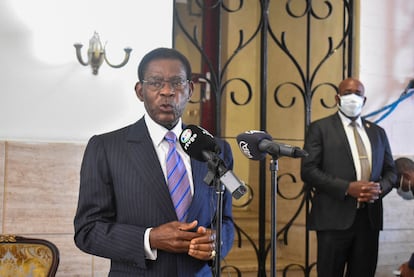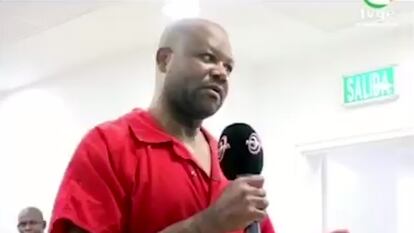Spain investigates members of Equatorial Guinea’s regime for kidnapping and torture
A son of Teodoro Obiang, who has ruled the African nation with an iron fist since 1979, and other top members of his security apparatus have been implicated in the kidnapping and torture of two Spanish citizens


Spain’s national high court, the Audiencia Nacional, is investigating top security officials of the regime in Equatorial Guinea for allegedly kidnapping and torturing two Spanish citizens. Equatorial Guinea is a former Spanish colony that gained independence in 1968 and has been ruled with an iron fist by President Teodoro Obiang since 1979.
EL PAÍS has learned that those being investigated are Carmelo Ovono Obiang – one of the president’s sons – who acts as the head of the country’s secret service abroad, as well as Nicolas Obama – minister of internal security – and Isaac Ngema, who is the director of presidential security.
Police reports indicate that the three men traveled on the presidential jet while transporting Feliciano Efa Mangué, 44, and Julio Obama, 51, from South Sudan back to Equatorial Guinea. Both Spanish citizens, these two men were detained by the regime in 2020. Allegedly, they were tortured repeatedly – alongside other Equatorial Guineans – at a national prison, where they remain incarcerated after being convicted of planning a coup d’état at a trial without judicial guarantees.
For the Spanish authorities, President Obiang and his son Teodorín Nguema Obiang are the main culprits in these kidnapping cases, as well as other abductions of political opponents that have taken place across Europe. Carmelo Ovono Obiang, who has military training, helms the secret service in charge of collecting intelligence abroad.
Two of the three men under investigation have roots in Spain. Carmelo Ovono Obiang, 44, was the first chief of the Special Forces in the Guinean city of Bata. He obtained residency in Spain in 2020. He is married to a Spanish woman, with whom he has a daughter. He owns homes in Marbella, Toledo and Barcelona, and managed to get permanent status by disclosing a bank account at BBVA with a balance of €431,378. This individual, who runs a Málaga-based business called Dereck Edita y Hermanos SL purportedly devoted to real estate rentals, has been under constant police surveillance for some time.
Nicolás Obama – Equatorial Guinea’s 58-year-old minister of national security – lives in Villalbilla, a small town east of the Spanish capital Madrid, and is married to a Guinean woman. He is the father of five children who live in Spain. And Isaac Nguema, Papi, referred to as a “torturer” by the Spanish police, frequently travels to the country.
Two protected witnesses have provided testimony regarding the illegal activities of President Obiang’s men. The case against them is also based on reports by several victims who were able to get the word out from Oveng Azem penitentiary thanks to a prison worker who has fled the country. .Juan Carlos Ondo – former president of the Supreme Court of Equatorial Guinea, now a refugee in Spain – is another key witness. He has told Judge Santiago Pedraz – who is in charge of the case at Spain’s Audiencia Nacional – about the lack of free and fair trials faced by political opponents who are kidnapped abroad and transported home to face the pro-Obiang courts.

The judicial investigation has been carried out with the utmost secrecy, so that internal information wouldn’t leak to the authorities of Equatorial Guinea. In numerous letters to international institutions and organizations, there have been repeated requests for “discretion.”
Spanish investigators have classified the acts allegedly committed as “crimes against humanity.” The investigation concludes that this case has a multitude of patterns in common with other kidnappings of Obiang’s opponents in Europe and across the African continent.
In Spain, at least one assassination attempt has also been registered: it took place in 2005, when two Colombian hitmen failed to kill German Pedro Tomo, a resident of Madrid, stabbing his brother instead. Since 2017, the number of political threats against Equatorial Guineans residing in Spain has increased dramatically.
The Spanish police say that they have shown that there is a “systematic and organized strategy of political persecution” orchestrated by the regime in Equatorial Guinea. The agents have established a common connection point at Europol, where all international information from similar cases is being channelled. Investigators have contacted several victims, who have also provided testimony.
Together with the Italian police, investigators are also looking into the kidnapping of political dissidents Fulgencio Obiang Osono and Francisco Micha on Italian soil. The two ended up imprisoned in the Central African country.
In a recent report, Obiang’s regime is described thus by the Spanish police: “[Equatorial] Guinea is a dictatorial regime that persecutes and represses its detractors internally and externally… it acts beyond international channels. In recent years, there have been numerous cases of abductions, forced transfers, torture, murder and death sentences against well-known opponents residing abroad.”
The accusation against the three main suspects in the most recent of these cases is based on a complaint filed by the family members of the disappeared political opponents. Further legal action was brought by Aitor Martínez, a Spanish attorney representing the Movement for the Liberation of Equatorial Guinea Third Republic (MLGE 3R). Judge Santiago Pedraz admitted the case, with the support of prosecutor Vicente González Mota.
Both legal moves followed the 2020 arrest in South Sudan of the two Spanish nationals, along with two citizens of Equatorial Guinea who were residing in Spain,, Bienvenido Ndong Ondo, 44, and Martín Obiang Ondo, 45. All four are leading dissidents who oppose the dictatorial regime in Equatorial Guinea.
The judicial investigation has proven the identity of the people who were used by the government of Equatorial Guinea to deceive the victims and lure them to South Sudan, where they were subsequently detained and put on Obiang’s presidential jet.
“Do you know Obiang? He is our friend and he paid a lot of money for you,” a Sudanese soldier allegedly snapped at them. They were then flown out of Juba to President Obiang Nguema International Airport in the town of Mengomeyén, Equatorial Guinea. They were handcuffed, with sacks placed over their heads and cloths stuffed inside their mouths.
According to the detainees’ own testimony – which appears in various audio recordings of the judicial case – in the Guinean prison, they had their legs shackled and were hung upside down to cause their blood vessels to burst in a type of torture that has also been described by other dissidents who spent time in the country’s prison system. Naked, they were lashed with electric cables and doused with boiling water.
“What do you think Spain can do for you?” one of the jailers yelled at them. The testimonies note that the detainees are being kept in tiny underground cells without natural light, where they are given rotten food.
The Spanish police describe this transfer out of South Sudan as “forced and extrajudicial,” while noting that members of the Equatorial Guinean political opposition in Europe pose no danger to national security.
The Spanish embassy in Malabo – the capital of Equatorial Guinea – took months to prove that the two Spanish citizens were, in fact, being jailed in the country, due to the local authorities’ refusal to cooperate.
After being forced to give self-incriminating statements from prison regarding their participation in a supposed coup against Obiang, they were sentenced via televised trial. Efa and Obama were given jail terms of 90 and 60 years respectively. Bienvenido Ndong and Martín Obiang were sentenced to 90 years each.
Before the cameras, the accused apologized to the dictator. Amnesty International and Human Rights Watch have denounced the sham trial and described the accusations as false.
Sign up for our weekly newsletter to get more English-language news coverage from EL PAÍS USA Edition
Tu suscripción se está usando en otro dispositivo
¿Quieres añadir otro usuario a tu suscripción?
Si continúas leyendo en este dispositivo, no se podrá leer en el otro.
FlechaTu suscripción se está usando en otro dispositivo y solo puedes acceder a EL PAÍS desde un dispositivo a la vez.
Si quieres compartir tu cuenta, cambia tu suscripción a la modalidad Premium, así podrás añadir otro usuario. Cada uno accederá con su propia cuenta de email, lo que os permitirá personalizar vuestra experiencia en EL PAÍS.
¿Tienes una suscripción de empresa? Accede aquí para contratar más cuentas.
En el caso de no saber quién está usando tu cuenta, te recomendamos cambiar tu contraseña aquí.
Si decides continuar compartiendo tu cuenta, este mensaje se mostrará en tu dispositivo y en el de la otra persona que está usando tu cuenta de forma indefinida, afectando a tu experiencia de lectura. Puedes consultar aquí los términos y condiciones de la suscripción digital.








































